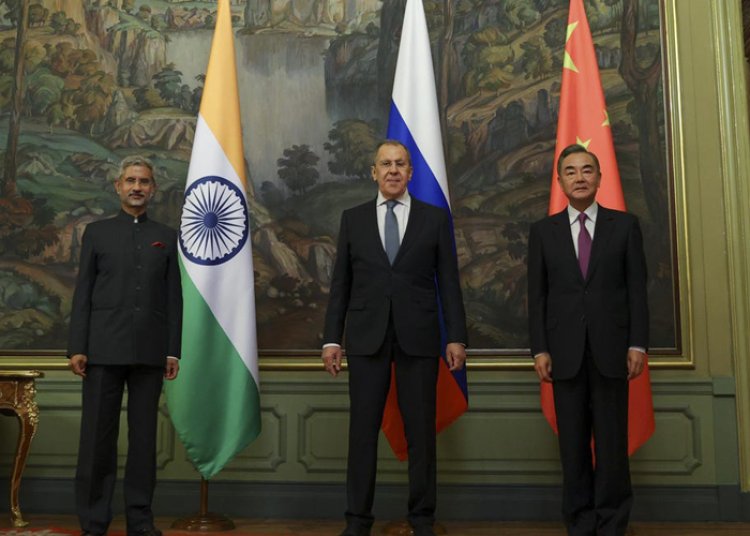India, China, and Russia against Dollar dominance?
Explore how India, China, and Russia challenge dollar dominance in global finance. Discover the strategies and implications in this enlightening blog.

India, China, and Russia against Dollar dominance?
Global Currency Systems - GCS
International trade and finance employ global currency systems. Businesses and organizations must be able to swap currencies to function internationally. The global currency system is complicated and changes with the global economy and politics. International traders must comprehend this framework.
The global monetary system relies on exchange rates. Exchange rates are currency exchange prices. Supply and demand in the 24-hour global foreign exchange market decide them. Economic development, inflation, and political instability may substantially affect exchange rates. Exchange rate swings can hurt international commerce enterprises and consumers.
Central banks are crucial to the global monetary system. Central banks manage currencies and preserve foreign exchange market stability. They manage interest rates, money supply, and currency markets to prevent excessive exchange rate volatility. Central banks can also coordinate monetary policy to stabilize the global financial system. International business and financial professionals must understand central bank roles in the global currency system.
In conclusion, the global currency system is a dynamic network of currencies, exchange rates, and central banks. Cross-border businesses and people must master this system to handle funds and transactions. International traders and financiers must understand currency rates and central banks.
Currency Evolution
A global currency system is a network of organizations, structures, and agreements that enable cross-border money trade. This system's currency development is crucial. Ancient civilizations utilized gold and silver as currency. Without a currency, barter transactions were frequent.
Greece created the first genuine monetary system in approximately 500 BC. They traded metal coins. Rome's 3rd-century BC money system followed suit. Early money systems allowed commerce and fast economic development by standardizing trade and exchange between areas.
New currencies replaced old ones. Modern international currencies are based on the medieval gold standard. Several nations embraced the gold standard in the 19th century. After World War II, the US dollar became the reserve currency in a modified gold standard system. The International Monetary Fund regulated fixed exchange rates. Central banks govern most fiat currencies today. Technology, politics, and economics have shaped money systems.
US Dollar Impact on Global Economy
Global Currency Systems are the world's monetary systems. It also covers currency exchange rate mechanics. Such monetary systems enhance international trade and investment by enabling efficient goods and service exchange. The US dollar is the world's leading currency.
The US Dollar's global role is vital and diverse. Trade settlements, foreign exchange reserves, and financial transactions worldwide use the US dollar. Most countries maintain US dollars in their foreign exchange reserves to protect their currencies from unexpected shocks. As global oil transactions are mostly in US dollars, the US currency also affects oil markets.
Seigniorage benefits from the US dollar's standing as a worldwide reserve currency allowing it to borrow cheaply. As a currency and unit of account, the US dollar facilitates international trade. Even non-US traders can trade in US dollars. This simplifies international trading and eliminates currency risk.
Finally, the US dollar's importance in the global economy cannot be overstated. The US dollar's global supremacy is projected to last. International transactions like it because of its efficiency and dependability. So, officials globally must monitor its function and influence on the global economy to ensure it runs properly with minimal negative effects.
Global Currency Critiques
The IMF and World Bank's global currency systems enhance worldwide commerce and finance. World currency systems keep cash flowing and prices steady. Yet, these systems have been criticized and encountered several obstacles that hamper their success, necessitating currency reform.
Global currency systems are criticized for their overreliance on the US dollar, the default global currency. Several nations worry that their currencies' values are highly impacted by the US dollar, which has led to a loss of monetary sovereignty. As the world currency, the US benefits from overreliance on the dollar, which may misallocate resources.
Global currency systems cannot address global economic imbalances, another objection. As countries trade surpluses or deficits, their currencies depreciate. World currency systems have failed to fix this, causing economic instability. IMF and other measures have also been criticized as undemocratic and favour specific nations.
Lastly, global monetary systems are criticized for failing underdeveloped nations. These systems prioritize industrialized countries over emerging ones, which are typically neglected in global currency system decisions. This makes many such nations unable to compete in the global economy, resulting in global inequality.
Overall, global monetary systems have been criticized and challenged. These systems struggle with overreliance on the US currency, global economic imbalances, and neglect of poor nations. These systems require reforms to be more inclusive, transparent, and responsive to all nations.
Currency Futures and Economic Growth
Businesses, governments, and economists must carefully evaluate currency system futures and economic progress. Technology and globalization have rapidly changed money systems. Digital currencies have changed the way we think about, utilize, and store monies.
Digital currencies can boost global economic growth. Digital currencies are decentralized, making them easier and safer to use internationally. Digital currencies might make financial institutions more efficient and accessible by removing obstacles. This might increase financial inclusion in areas without traditional banks, benefitting lives and economic growth.
Digital currencies may exacerbate economic instability. Digital currencies might cause financial market bubbles. Digital currencies are unregulated, making fraud and money laundering easier. To prevent economic dangers from digital currencies, people, businesses, and governments must build a strong regulatory framework.
Finally, global monetary systems have changed irreversibly, affecting economic progress. Digital currencies might improve financial access and economic growth in poor nations. They also pose economic hazards that must be carefully assessed. To ensure sustained economic growth for everybody, currency systems must balance these pros and cons.
Dollar Predominance
Dollar supremacy is the global domination of the US dollar. It has persisted for decades. This is due to the US's economic and military dominance, its status as the world's main hub of invention and technical growth, and its stable financial system.
Dollar domination goes beyond the US military and economic might. It is multifaceted and reflects global faith in the US currency and financial system. As of 2020, 62% of the central bank's foreign exchange reserves are in US dollars, the world's reserve currency. For financial stability and liquidity, several countries retain large quantities of US dollars or dollar-denominated assets like US Treasury bonds in their reserves.
The US dollar is also frequently utilized in international commerce, especially in the oil and commodities sectors, causing significant dollar demand. Due to the dollar's dominance in global banking, several nations base their exchange rate regimes or export prices on it. These characteristics help make the US dollar the world's reserve currency.
The world's financial system relies on the US Dollar's dominance. The US's economic and military dominance, inventions, and financial system stability explain its importance in international commerce and as the reserve currency. Dollar supremacy will certainly endure for the foreseeable future, barring major geological changes.
Dollar Supremacy Origin and Definition
Since WWII, the US dollar has ruled the world. "Dollar Supremacy" is crucial to the global economy. Dollar Dominance refers to the US dollar's dominance in the global financial system.
Dollar Dominance began after World War II when the US economy was the only one remaining. The 1944 Bretton Woods Accord made the US dollar the world's reserve currency. This arrangement tied other currencies to the US dollar. So, countries required a reliable dollar supply to run their economies, increasing demand for the US dollar.
International trade still relies on the US dollar. Almost 60% of worldwide currency reserves are in US dollars. The US dollar's dominance lowers interest rates for the government and US corporations, strengthening the US economy. Dollar Supremacy describes the US's economic and financial strength as the world's reserve currency issuer.
Dollar Supremacy Pros and Cons
The US dollar is the world's reserve currency, used by central banks to retain foreign exchange reserves and pay for international commerce. The US and global economy gained and suffer from the dollar's reserve currency status.
Dollar dominance lets the US borrow money from other countries at lower interest rates because investors trust the American economy. The US can easily cover its budget deficits and preserve its economic powerhouse status. As the dollar is the world's reserve currency, other nations must retain huge amounts of dollars in their foreign exchange reserves, which boosts the US economy.
Dollar domination has downsides. US currency changes can harm the global economy. If the dollar gains, US exports become more expensive and less competitive, hurting American firms and causing job losses. The US risks inflation and dollar devaluation by printing money to cover its deficits.
Dollar domination has many pros and cons. Economists and politicians worldwide analyze it because it benefits the US economy but also brings risks and obstacles. Anybody concerned with international commerce and finance must understand dollar supremacy, which is becoming increasingly essential in global politics and economics.
Dollar Dominance and World Economies
Dollar Supremacy is the dominance of the US dollar in worldwide trade and finance. Almost 60% of foreign exchange reserves are in dollars, the world's reserve currency. So, central banks and governments worldwide retain dollars as a major foreign exchange reserve. Over 80% of world trade is performed in dollars.
Dollar domination affects the global economy greatly. As the US dollar dominates worldwide commerce and finance, fluctuations in its value can affect global economies. American hegemony over other nations is a major impact. The US may use its dominance over the dollar to censure other nations or restrict access to the global financial system since the dollar is so vital in global commerce. This provides the US with huge influence over other nations.
Dollar supremacy affects global financial stability. Dollar swings can destabilize global markets due to their dominance. For instance, if the US Federal Reserve raises interest rates, the dollar's value rises, making foreign borrowing more costly. This can destabilize other currencies and the economy.
Dollar domination is a complicated issue that affects the global economy. The US dollar dominates worldwide commerce and finance, and its value can affect other nations. As the globe grows more interconnected, we must grasp how dollar supremacy affects the global financial system and encourage economic stability and collaboration.
Future Dollar Supremacy and Alternatives
Since WWII, the US dollar has dominated the global economy. International trade and finance have mostly used the dollar, the world's reserve currency. Economists and officials worldwide have debated dollar supremacy's future. The future of dollar supremacy and alternatives examines financial system changes and alternatives.
A financial system transition might affect the US and the worldwide economy. Skepticism about the US government's economy and the national debt is a factor in the dollar's depreciation. China and Russia's attempts to make their currencies competitive with the dollar also threaten the dollar's supremacy. Several countries are diversifying their reserves into other currencies, such as the Chinese Yuan and the Euro, signifying a change in global financial dominance.
Other currencies may challenge dollar supremacy, but they face considerable obstacles to replacing the US dollar. The liquidity, stability, and depth of US financial markets keep the US dollar as the world's reserve currency. The US dollar's widespread usage in worldwide commerce and finance requires major financial system reform. Bitcoin and Ripple, which enable peer-to-peer transactions outside the banking system, may threaten dollar domination.
In conclusion, the future of dollar supremacy is uncertain, but alternatives have increased the possibility for change in the international financial system. Skepticism about US economic management, growing debt, and new alternatives are threatening dollar supremacy. The US dollar's status as the world's reserve currency makes it difficult for credible alternatives to develop. The international financial system's currency dominance is uncertain.
Geopolitics
Geopolitical relationships involve intricate political, economic, and security linkages between nations. These partnerships can be cooperative or competitive, depending on location, culture, and history. Understanding geopolitical linkages are critical in today's fast-changing world because they affect global finance, commerce, and security.
Thucydides, a Greek historian, named "the Melian Debate" to describe Athens-Sparta relations. Geopolitical relationships still influence diplomatic and commercial agreements worldwide. Geopolitical interactions involve bilateral, regional, and international institutions including the UN, World Bank, IMF, and WTO.
In conclusion, knowing geopolitical relationships is essential for understanding historical and present political developments, global economic and political concerns, and the future of international relations. Today's global complexity necessitates a deep comprehension of this topic. Maintaining open and productive partnerships with global superpowers is essential for global peace, economic prosperity, and a stable future for all nations.
India geopolitics
India has long led regional and global geopolitics. India's strategic location between the Middle East and East Asia has made it a political and economic powerhouse since the Cold War. Its geostrategic prominence and worldwide relationships make it a key actor in global affairs.
India's foreign policy is heavily influenced by its neighbors. India has complicated geopolitical connections with Pakistan, China, Nepal, Bhutan, Bangladesh, and Burma. India's relationship with Pakistan has been hostile and distrustful, whereas its relationship with China has been about territorial conflicts and economic competitiveness. India has a good connection with Nepal, Bhutan, Bangladesh, and Burma, helping them grow and cooperate economically.
India's strategic alliances with the US and Russia have also shaped its foreign policy. During the Cold War, India and Russia worked together in the military and energy domains. India and the US have expanded their partnership to offset China's dominance in the area. India and the US have strengthened diplomatic relations and collaborated in military, trade, and technology.
In conclusion, India's foreign policy depends on geopolitics. India has formed alliances with several states due to its geostrategic importance. India's foreign policy and regional cooperation have been impacted by its connections with its neighbors and global powers like the US and Russia.
China geopolitics
Geopolitical ties are motivated by nations' domestic and strategic objectives. Economic, political, cultural, and military variables shape these ties. As states pursue their goals and balance their geopolitical connections, they are always changing. China-world geopolitics is an example.
The world is watching China, a growing powerhouse. Economic, military, and political objectives determine the nation's global view. China's GDP, second only to the US's, is increasing rapidly. Because of its economic might, China has been embracing programs like the Belt and Road Initiative to expand its influence abroad.
Military might have also shaped China's geopolitics. The military has spent substantially on sophisticated weaponry systems and naval capabilities. China's military activity in the South China Sea has raised tensions with its neighbors, notably the US. Hence, China and the US compete for regional influence and strength, complicating their relationship.
China's geopolitics is crucial to comprehending international interactions. China's rising economic and military might allow it to pursue its strategic goals both domestically and abroad. Economic, military, and political objectives drive China's international relations. As China becomes a superpower, its geopolitical alliances will be crucial for states worldwide.
Russia geopolitics
Russia has traditionally influenced global geopolitics. Russia shifted its geopolitical emphasis from communism to capitalism after the Soviet Union collapsed in 1991. This change has also affected its geopolitical connections. Russia's geopolitics are complicated, and various variables affect its interactions with other nations.
Russia's topography affects its geopolitics. Russia's huge terrain and limited population have left it vulnerable to attack. Russia's foreign policy has focused on border security and sovereignty due to its vulnerability. Central Asia, Eastern Europe, and the Middle East, which have historically been unstable and tense for Russia, have drawn attention.
Natural resources also influence Russia's geopolitics. Russia has abundant oil, gas, mineral, and other resources. During the Soviet period, Russia's natural riches made it a worldwide power. This has caused conflicts with nations like the US, who want to limit Russia's economic dominance.
Lastly, politics and ideology shape Russia's geopolitics. Once the Soviet Union collapsed, Russia struggled to establish its political character. The political environment is complicated despite its capitalist economic basis. The ruling party is accused of repressing dissent and curtailing free speech. Western countries have pushed to make Russia accountable for these concerns, causing tensions.
Russia's geopolitics is complicated and dynamic, shaping global ties. Geography, natural resources, and politics shape Russia's international connections. Global politics, economics, and security require knowledge of Russia's geopolitics.
Anti-Dollar Cooperation
The US dollar's dominance as the reserve currency has shaped the global order. This gives the US power, influence, and the ability to censure and punish countries that don't comply. Countries are increasingly attempting to end this domination and develop a multi-polar structure that better represents the global situation. This has prompted debates and potential partnerships among countries to challenge the US dollar.
The BRICS (Brazil, Russia, India, China, and South Africa) New Development Bank, which aspires to compete with the World Bank and the International Monetary Fund, is a major development. The bank provides reputable finance for infrastructure and development initiatives in emerging economies. This bank indicates that countries no longer need US-led financial institutions and can work together to develop organizations that better serve their interests.
Other trade currencies are another sign of the dollar's decline. China wants to make the yuan a worldwide currency. The government has also negotiated various currency exchange agreements to trade in currencies other than the US dollar. These actions lessen dependency on the US currency and increase economic relations between countries, which might lead to further partnerships.
The possible partnership against dollar domination is a major geopolitical development. Nations want their own, more representative financial institutions instead of relying on US-led ones. Trade in alternative currencies suggests a multi-polar system that might transfer power away from the US. Collaboration among countries challenges the established order and gives rising economies more influence in the global environment.
Alternate IMF Systems
International monetary systems help global trade. Several monetary systems have been implemented, each having pros and cons. None of these methods have solved complicated economic challenges in many nations. Alternative international monetary systems apply here. These solutions aim to solve global economic concerns more fairly and sustainably than existing monetary systems.
Alternative international monetary systems are new, but economists and politicians have recently taken notice. These approaches strive to balance and equalize the global economy. Gold, barter, and Bitcoin are alternative worldwide monetary systems. Each system has benefits, but they all use decentralized monetary policy.
Global economic stability drives alternative international monetary systems. Conventional monetary systems are volatile and increase economic inequality. Alternative systems use inclusive and sustainable monetary policy to solve these challenges. Many prefer these arrangements because they are more transparent and less prone to manipulation by huge financial firms. Alternative international monetary systems may help create a more stable and fair global economy as the globe grows more linked.
Understanding the Present IMF
Global commerce and economic activity are supported by the complex international monetary system of financial institutions, agreements, and currencies. The US dollar is the main reserve currency, and the IMF enforces its standards. Since the 1944 Bretton Woods Conference, the system has undergone many difficulties and reforms.
The US dollar's status as the world's reserve currency is one of the system's main features. This implies that many nations maintain large sums of US dollars as foreign exchange reserves and use them in global commerce and finance. America's economic and political might and lengthy history in global banking since World War II explain the dollar's dominance. As the US government's debt rises and economic power moves to develop economies, the dollar's hegemony has raised questions about its stability and durability.
The 1944-founded IMF promotes worldwide economic cooperation and financial stability. The IMF analyses global economic trends and lends to member nations in economic crises. The IMF has been criticized for its austerity tactics and apparent bias towards wealthier nations. Regional financial organizations like the Asian Infrastructure Investment Bank have challenged the IMF's position by providing alternative finance and investment.
Economics, finance, and global business professionals must grasp the present international monetary system. Many players and factors influence the complex and dynamic system. One may better understand the global economy's difficulties and potential by studying the US dollar, IMF, and other factors.
IMF alternatives
Alternate international monetary systems are alternatives to Bretton Woods. Traditional trade and currency imbalances were caused by the US dollar as the reserve currency. Alternative international monetary systems promote a more stable and balanced financial system to solve these issues. The Euro as a reserve currency and regional currencies like the African Economic Community are alternatives (AEC).
Euro is a popular alternative to the international monetary system. The European Union established the Euro in 1999 to solve monetary imbalances. The Euro is a reserve currency, held by central banks and other financial institutions worldwide. Stability, low inflation, and economic scale make the Euro a good reserve currency. The Euro faces issues like the European debt crisis.
The African Economic Community is another multinational monetary system (AEC). The AEC wants to develop a single currency for African countries to boost commerce and economic progress. A central bank would support the Afro, a Euro-like currency. Due to political and economic issues in Africa, a common African currency has taken decades to develop. Nonetheless, the AEC promotes African economic integration and prosperity.
In conclusion, various international monetary systems are necessary for financial stability. New currencies and regional monetary systems try to fix currency imbalances and economic instability. Recent successes include the Euro and AEC, but a genuinely global and inclusive financial system is still a long way off.
Replace Dollar Supremacy?
Since the 1944 Bretton Woods Accord, the dollar has ruled the global economy. Nonetheless, recent global economic events have suggested replacing the present international monetary system. This raises questions about replacing dollar domination. This article discusses dollar supremacy's pros and cons.
Replacing Dollar Dominance Benefits
US dollar supremacy has caused global economic imbalances. Secondly, cheap global borrowing has kept the US trade imbalance high. Second, the US has used its currency to inflict economic sanctions on other nations, generating economic uncertainty worldwide. Lastly, the dollar's dominance has led to other nations retaining huge dollar reserves, which are greatly influenced by its market volatility.
Countries would benefit from dollar replacement. China, Russia, and others want a new international monetary system. This new arrangement would weaken American economic dominance and balance trade. Replacing dollar supremacy would give other nations more authority over monetary policy, strengthening their economies.
Replacing Dollar Supremacy's Drawbacks
Replacing dollar domination has major drawbacks. First, global economic upheaval may occur soon. Changing to a new international monetary system might cause a worldwide recession since the dollar is the leading currency. Second, creating a new international monetary system that suits all nations will be challenging. All countries must agree on a successor that meets their economic needs.
Lastly, certain economies depend on the US currency to be stable. Removing the dollar's supremacy would destroy faith in the present economic system and require time to acclimatize to the new international monetary system.
In conclusion, replacing dollar supremacy with other international monetary systems would have major benefits and variable degrees of drawbacks. To minimize downsides and maximize upsides, replacing dollar supremacy requires extensive research. Replacing dollar domination incorrectly might cause global economic instability, causing more harm than good.
We hope this article may have helped you understand the forex market and trading. It is important that in this era of uncertainty, we all need a side hustle and income. Trading Forex is the best that it is. Please don't ever think of trading as gambling. Everyone can sing, but only a few can SING. It is a calling. For all those who want to make money in Forex trading without doing the deed of strenuous trading - CLICK HERE.
Happy Trading
To read more interesting articles CLICK HERE
Why do you need to be with TradeFxP? CLICK HERE
To join our Hunter AutoBot Trading Program CLICK HERE
All About TradeFxP's Hunter Ai EA Autobot CLICK HERE



 admin
admin 










